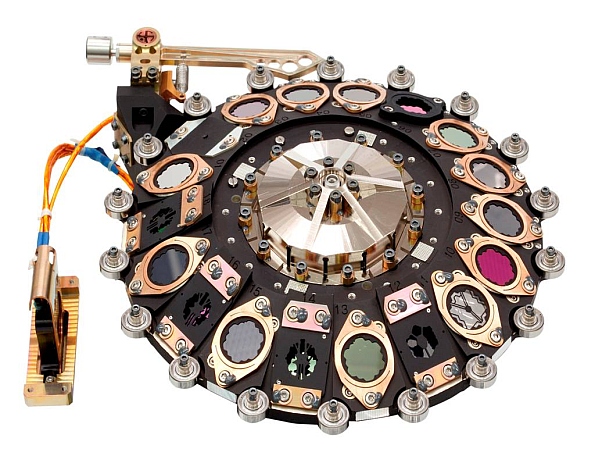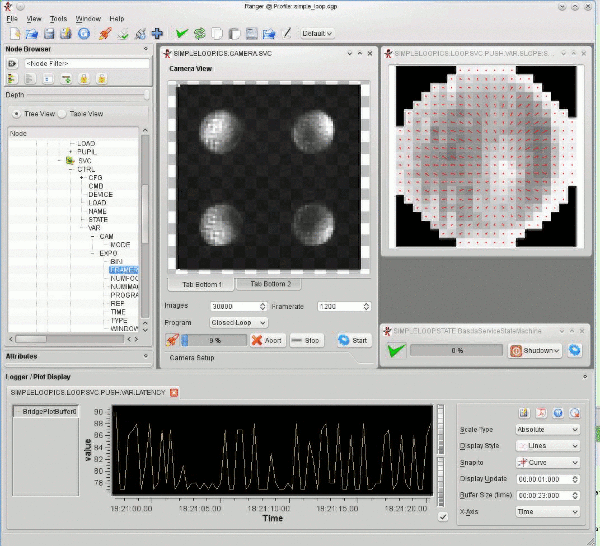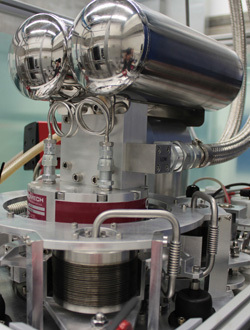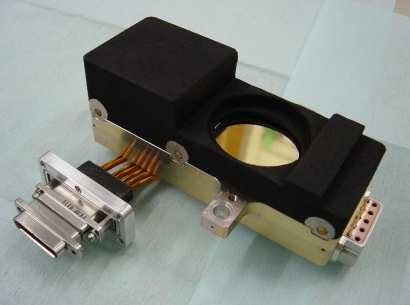| Version 583 (modified by , 18 months ago) (diff) |
|---|
The AstroTechTalk (ger) offers a place to discuss, for all interested colleagues and especially for the technical departments, the project leaders, the administration and the scientists as the ultimately users:
- status of instrumentation projects
- scientific tasks and features of the instruments in construction or planned
- new possible involvements
- technical innovations and developments
- technical problems and their solutions
- logistical problems and their solutions
- how to improve operation and observation
- project standards.
New Time: Always Mondays 15:00 - 16:00
Location: Hybrid -> MPIA Hoersaal + Video-Link
Link: https://eu01web.zoom.us/j/65407509821?pwd=cEdxMHZ1RkVGV1JTYXpCc3N3cG4vdz09
Outline:
- Announcements (news, visitors, etc.) (mainly in German)
- Talk of about 30 min about a selected topic (German or English, will be announced)
- Follow up discussion and questions (German or English, depending on the speaker)
Proposals for talks: Please send an email to "huber -at- mpia.de" or "naranjo -at- mpia.de" - alternatively you might reach us by phone (06221-528331 or -290) or in person (room 111 or 018) at MPIA.
| Date | Speaker | Topic |
| 20.02.2023 | Simon Gross (Macquarie University, Sydney) | Integrated Photonics for Astronomical Interferometry Applying photonic technologies to astronomical instrumentation is a growing field. High contrast imaging using interferometry especially benefits from the inherent stability and robustness provided by integrated photonics. This talk will provide an overview of the photonics for interferometry we have been working on at Macquarie University. The GLINT instrument at the Subaru telescope is a multi-baseline nulling interferometer based on 3D integrated photonics operating in the H-band. The talk will present the instrument concept and will introduce the planned upgrades in the coming years to add new capabilities and vastly improve its performance. Moreover, the talk will touch on recent progress on the L-band beam combiner for SCIFY (Self-Calibrated Interferometry For exoplanet spectroscopy), an instrument planned for the VLTI. Presentation: English Slides: English Questions: German, English |
| 27.02.2023 | -- | -- |
| 06.03.2023 | -- | -- |
| 13.06.2023 | -- | -- |
| 20.03.2023 | Fachbeirat | -- |
| 27.03.2023 | -- | -- |
| 03.04.2023 | -- | -- |
| 10.04.2023 | Holiday | -- |
| 17.04.2023 | Jiao He, Tushar Suhasaria | An overview on the experimental setups in the Origins of Life Lab Over the last two decades, laboratory astrochemistry has played an immense role in elucidating how some of the complex organic molecules (COMs) are formed from simple molecular ice in the coldest regions of dense molecular cloud. Chemistry in the solid state can be driven by either the non-energetic processing (atom bombardment) or energetic processing (irradiation with ions, electrons and protons). Organic molecules continue to evolve as interstellar material transit from molecular clouds to planetary systems. A deeper understanding of the physical and chemical processes involved in the formation and evolution of prebiotic COMs may provide valuable insights into the origins of life. To this end, we have two setups in the origins of life lab that work in ultra-high vacuum regime and at cryogenic temperatures to mimic the space conditions. In the first setup, we focus on the formation of molecules by atom addition reactions in the solid state. We use quadrupole mass spectrometer and Infrared spectroscopy to monitor changes in the ice. In the second setup, we can look at the energetic processing of single or multicomponent ices by energetic electrons or UV photons. In addition to IR spectroscopy, we will also employ a tunable ns-IR laser to first desorb and then a ns-UV laser to ionize molecules produced in the ice mixture. The formed ions will then be guided to a very high resolution Orbitrap mass spectrometer for in-situ detection. The work of the Origins of Life laboratory will provide crucial data to the astrochemical and astrophysical community. Presentation: English & German Slides: English Questions: German, English |
| 24.04.2023 | Walter Seifert (LSW) | Instrumentation projects at the Landessternwarte (LSW) The LSW is involved in several instrumentation projects for medium and large telescopes. During the talk these will be presented and, of course, our contributions will be discussed in particular. Details of the technical solutions or approaches for the instruments will be described, as well as the current status of the projects. Besides CUBES (ESO VLT), MOSAIC (ESO ELT), CARMENES PLUS (CAHA 3.5), ANDES K-band spectrograph (with MPIA, ESO ELT) and 2ES (LaSilla 2.2) the focus will be on the 4MOST high resolution spectrograph for the ESO VISTA telescope. Presentation: German Slides: English Questions: German, English |
| 01.05.2023 | Holiday | -- |
| 08.05.2023 | Jalo Nousiainen (LUT-Universität, Lappeenranta, Finnland) | Model-based reinforcement learning and inverse problems in extreme adaptive optics control The control of eXtreme Adaptive Optics (XAO) systems is crucial for the direct imaging of potentially habitable exoplanets on ground-based telescopes. However, current XAO control laws leave strong residuals, particularly at small angular separations from host stars where most habitable exoplanets are located. To address this issue, our recent work has focused on two approaches: Model-based Reinforcement Learning (MBRL) and spatio-temporal Gaussian process (ST-GP) regression. MBRL is a data-driven approach that learns control strategies from system feedback and promises to effectively manage factors that can hamper XAO performance, such as temporal delay, calibration errors, photon noise, and optical gains. I will present recent results from the GHOST test bench at ESO and discuss our future goals. ST-GP regression, however, allows for the theoretical examination of predictive control strategies. Factors that affect predictive controllers' performance include the wavefront sensor type, measurement noise level, AO system geometry (aliasing, actuator spacing), and atmospheric conditions (e.g., seeing, wind speed). Through ST-GP regression, we can explore the theoretical limits of predictive control under different conditions and geometries. Overall, our work aims to advance XAO control methods to enable high-contrast imaging of potentially habitable exoplanets using ground-based telescopes. Presentation: English Slides: English Questions: German, English |
| 15.05.2023 | -- | -- |
| 22.05.2023 | Institutsbesprechung | -- |
| 29.05.2023 | Holiday | -- |
| 05.06.2023 | -- | -- |
| 12.06.2023 | Hans Jürgen Kärcher (Consulting Engineer, Karben) | Optical Configurations for Extreme Large Telescopes - Viewpoint of a Structural Engineer The optical layout of large telescopes is defined by the science cases and related science instruments for which the telescope is designated. Design drivers for the optomechanical system of the telescope are the requested wavelength range, magnification, and field of view. The increasing diversity of the science cases leads to increasing expectations for size and quality of its main optical components. The lecture gives an overview on optical configurations of large telescopes for different wavelength ranges and throughput – optical, radio, infrared, solar etc., and describes the related challenges for their structural, and mechanical design. Presentation: German Slides: English Questions: German, English |
| 19.06.2023 | Hugo Coppejans & Horst Steuer | Real Time Computing in Adaptive Optics Systems Adaptive Optics is used in astronomy to correct for distortions of the incoming light into a telescope. Adaptive optics system generally consist of three core components: deformable mirrors, wavefront sensors and real time computers (RTC). In this talk we will focus on the RTC in particular on the one we are currently working on for METIS. What is the task of the RTC in the control loop and what can the RTC actually 'see'? What are the main data products and which computational steps does it have to do to produce them? What is a mode? How fast does the RTC have to be and what does 'Real Time' mean? How did we get the RTC to be fast enough and what are the main differences between a central processing unit (CPU) and a graphics processing unit (GPU)? We will address these and other questions in a graphic way. Presentation: German, English Slides: German, English Questions: German, English |
| 26.06.2023 | ||
| 03.07.2023 | -- | -- |
| 10.07.2023 | ||
| 17.07.2023 | -- | -- |
| 24.07.2023 |
Preview:
DD.MM.2023 - Speaker: Title
TBC - Manon Lallement: Photonic technology developments for the visible interferometer FIRST at the Subaru Telescope
Postview:
Presentations from 12.09. - 31.12.2014
Presentations from 01.01. - 31.07.2015
Presentations from 01.08. - 31.12.2015
Presentations from 01.01. - 31.07.2016
Presentations from 01.08. - 31.12.2016
Presentations from 01.01. - 31.07.2017
Presentations from 01.08. - 31.12.2017
Presentations from 01.01. - 31.07.2018
Presentations from 01.08. - 31.12.2018
Presentations from 01.01. - 31.07.2019
Presentations from 01.08. - 31.12.2019
Presentations from 01.01. - 31.07.2020
Attachments (11)
- instrum8_gr.jpg (82.6 KB) - added by 10 years ago.
- instrum4_gr.jpg (104.4 KB) - added by 10 years ago.
- pedv3_gr.jpg (213.9 KB) - added by 10 years ago.
- alfa3.5.gif (235.6 KB) - added by 10 years ago.
- CIAO.jpg (3.8 MB) - added by 8 years ago.
- linc_nirvana_labor.jpg (255.2 KB) - added by 8 years ago.
- MATISSE.jpg (43.1 KB) - added by 8 years ago.
- miri_fm_filterwheel.jpg (145.6 KB) - added by 8 years ago.
- PACS-Chopper.jpg (80.0 KB) - added by 8 years ago.
- simple_loop.gif (965.4 KB) - added by 8 years ago.
- teaser.jpg (13.5 KB) - added by 8 years ago.
Download all attachments as: .zip







